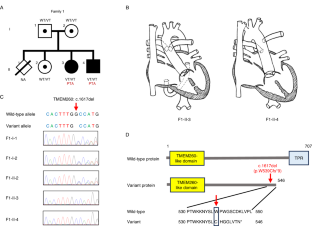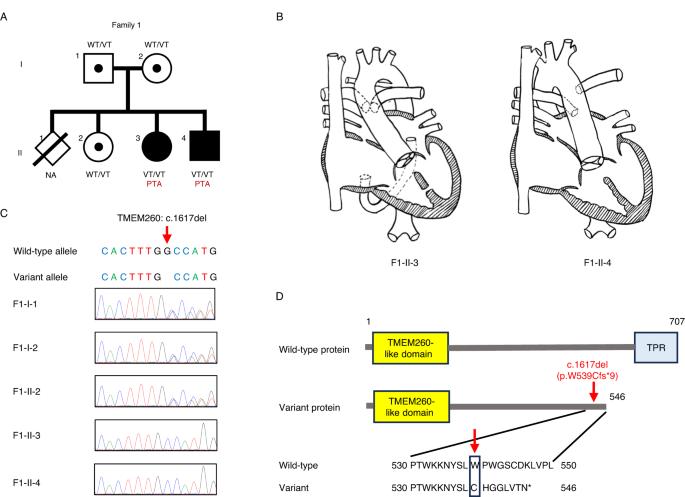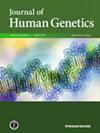TMEM260的c.1617del变异被确定为日本特定类型先天性心脏病患者最常见的单基因决定因素。
IF 2.6
3区 生物学
Q2 GENETICS & HEREDITY
引用次数: 0
摘要
虽然人们对先天性心脏病(CHD)的分子机制仍然知之甚少,但最近遗传分析的进步促进了对先天性心脏病致病基因的探索。我们报告说,编码跨膜蛋白的 TMEM260 的致病变体 c.1617del 与先天性心脏病高度相关,特别是与最严重的心脏流出道(OFT)缺陷--持续性动脉导管未闭(PTA)高度相关。通过全外显子组测序,在一个日本家庭中两个患有 PTA 的兄弟姐妹以及从患有 PTA 的日本人身上获得的 26 份 DNA 中的 3 份中发现了 c.1617del 变异。TMEM260的c.1617del变异只在东亚人,尤其是日本人和韩国人中发现过,据估计,该变异在PTA中的频率仅次于22q11.2缺失,而22q11.2缺失是PTA最著名的遗传病因。尽管 TMEM260 可导致结构性心脏缺陷和肾脏异常综合征(SHDRA),但 c.1617del 患者的表型似乎主要发生在心脏部位。小鼠 TMEM260 变体(p.W535Cfs*56)与人类变体(p.W539Cfs*9)同义,通过 Western 印迹技术显示出截短和下调,通过免疫细胞化学显示出聚集。原位杂交表明,Tmem260 在胚胎发育过程中普遍表达,包括在与 PTA 有关的心脏 OFT 的发育过程中。这种表达可能受 Tmem260 内含子 3 中约 0.8 kb 的基因组区域调控,该区域包括多个高度保守的心脏转录因子结合位点,从而揭示了 TMEM260 的 c.1617del 变异是导致日本人群 PTA 的主要单基因变异。本文章由计算机程序翻译,如有差异,请以英文原文为准。


The c.1617del variant of TMEM260 is identified as the most frequent single gene determinant for Japanese patients with a specific type of congenital heart disease
Although the molecular mechanisms underlying congenital heart disease (CHD) remain poorly understood, recent advances in genetic analysis have facilitated the exploration of causative genes for CHD. We reported that the pathogenic variant c.1617del of TMEM260, which encodes a transmembrane protein, is highly associated with CHD, specifically persistent truncus arteriosus (PTA), the most severe cardiac outflow tract (OFT) defect. Using whole-exome sequencing, the c.1617del variant was identified in two siblings with PTA in a Japanese family and in three of the 26 DNAs obtained from Japanese individuals with PTA. The c.1617del of TMEM260 has been found only in East Asians, especially Japanese and Korean populations, and the frequency of this variant in PTA is estimated to be next to that of the 22q11.2 deletion, the most well-known genetic cause of PTA. Phenotype of patients with c.1617del appears to be predominantly in the heart, although TMEM260 is responsible for structural heart defects and renal anomalies syndrome (SHDRA). The mouse TMEM260 variant (p.W535Cfs*56), synonymous with the human variant (p.W539Cfs*9), exhibited truncation and downregulation by western blotting, and aggregation by immunocytochemistry. In situ hybridization demonstrated that Tmem260 is expressed ubiquitously during embryogenesis, including in the development of cardiac OFT implicated in PTA. This expression may be regulated by a ~ 0.8 kb genomic region in intron 3 of Tmem260 that includes multiple highly conserved binding sites for essential cardiac transcription factors, thus revealing that the c.1617del variant of TMEM260 is the major single-gene variant responsible for PTA in the Japanese population.
求助全文
通过发布文献求助,成功后即可免费获取论文全文。
去求助
来源期刊

Journal of Human Genetics
生物-遗传学
CiteScore
7.20
自引率
0.00%
发文量
101
审稿时长
4-8 weeks
期刊介绍:
The Journal of Human Genetics is an international journal publishing articles on human genetics, including medical genetics and human genome analysis. It covers all aspects of human genetics, including molecular genetics, clinical genetics, behavioral genetics, immunogenetics, pharmacogenomics, population genetics, functional genomics, epigenetics, genetic counseling and gene therapy.
Articles on the following areas are especially welcome: genetic factors of monogenic and complex disorders, genome-wide association studies, genetic epidemiology, cancer genetics, personal genomics, genotype-phenotype relationships and genome diversity.
 求助内容:
求助内容: 应助结果提醒方式:
应助结果提醒方式:


